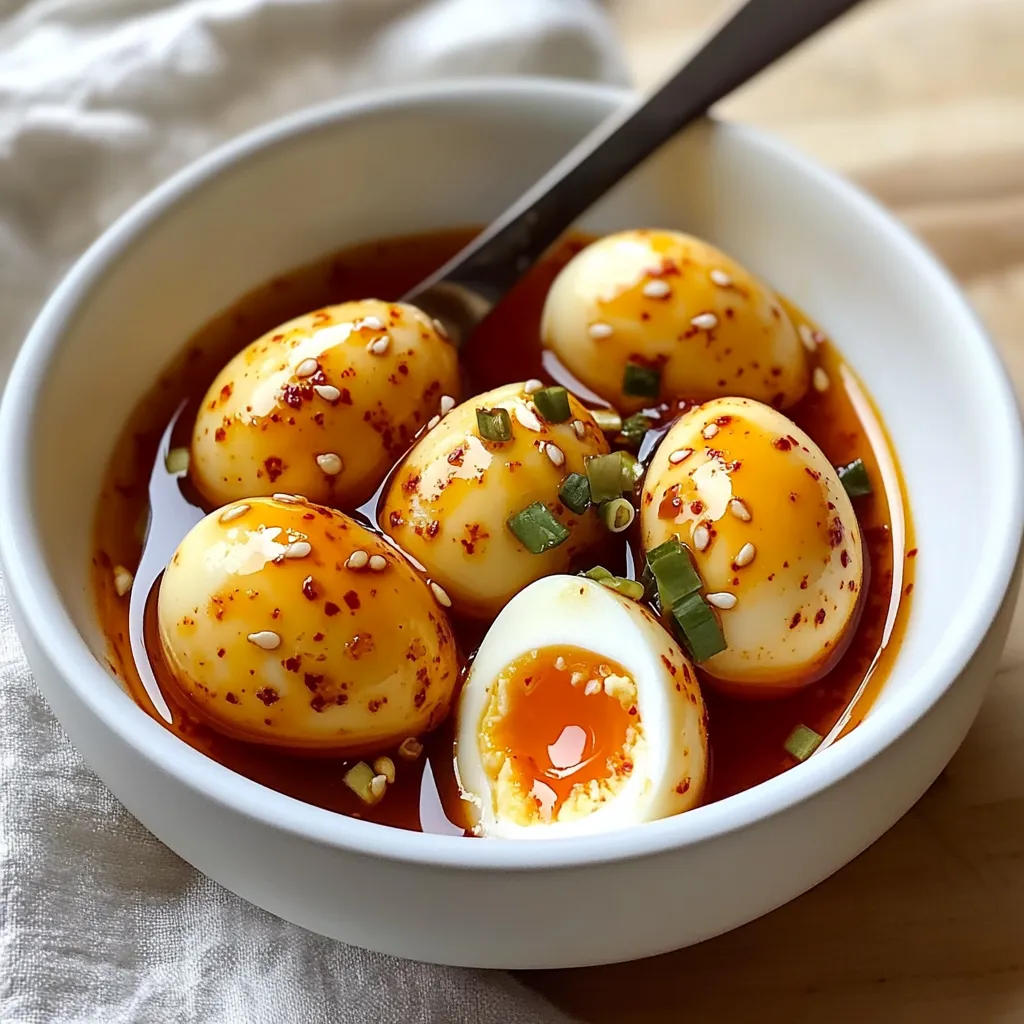A Sweet Taste of Nostalgia – The Story Behind Old Fashioned Orange Candy
Sometimes, the simplest dishes are the most memorable. Spicy Gochujang Eggs remind me of lazy weekend lunches when I wanted something satisfying but fast. The beauty of this recipe lies in how it turns plain boiled eggs into something rich, fiery, and deeply comforting.
The moment that gochujang sauce hits the pan, the aroma of garlic and chili fills the kitchen—it’s both warming and exciting. I love how the sauce clings to the eggs, creating that glossy, spicy coating that tastes even better over a bowl of hot rice. It’s a humble, homey dish, but it feels special every time.
What You’ll Need to Make These Sparkling Citrus Treats
You don’t need much to create this Korean-inspired flavor bomb. Everything comes together in under 20 minutes, and most of the ingredients are pantry staples if you cook Asian food often.
Ingredients:
- 2 large eggs
- 2 tablespoons gochujang (Korean chili paste)
- 1 tablespoon soy sauce
- 1 teaspoon sugar
- 1 tablespoon rice vinegar
- 1/4 cup chicken stock or water
- 1 tablespoon neutral oil (like canola or grapeseed)
- 2 cloves garlic, minced
- 1 tablespoon scallion, sliced
- 1 tablespoon toasted sesame seeds
Optional: A drizzle of sesame oil for serving
Preparing Your Oranges for Perfect Candying
To start, bring a pot of water to a rolling boil. Gently lower in your eggs and cover the pot. Cook for about 7 minutes for jammy centers, or a bit longer if you prefer them firm. While the eggs cook, prepare an ice bath by filling a bowl with cold water and ice cubes.
Once the eggs are ready, transfer them directly into the ice bath to stop the cooking process. This makes them much easier to peel later. When they’re cool enough to handle, peel them carefully and set them aside. You’ll notice how tender and smooth they feel—perfect for soaking up that spicy sauce.
Crafting the Syrup – The Secret to a Glossy Finish
In this case, the “syrup” is your gochujang sauce base. In a small bowl, whisk together gochujang, soy sauce, sugar, rice vinegar, and chicken stock (or water). You want a smooth, pourable consistency that balances spicy, sweet, salty, and tangy flavors.
Taste it before cooking—if you like it a little sweeter, add a pinch more sugar. If you prefer more heat, go heavier on the gochujang. This sauce is the heart of the dish, so adjust it to your liking.
Simmer, Soak, and Sweeten – How to Candy Orange Slices Like a Pro
Now, let’s cook. Heat neutral oil in a skillet over medium-high heat. Add the minced garlic and sauté for just 20–30 seconds until fragrant. Be careful not to burn it—garlic turns bitter fast.
Pour in your gochujang mixture and stir. As it heats, it will bubble and thicken slightly, filling your kitchen with a bold, savory aroma. Lower the heat to medium, then gently add your peeled eggs to the sauce.
Turn them occasionally with a spoon so they’re evenly coated. The sauce should cling beautifully, creating a deep red glaze that looks almost lacquered. After about 3–4 minutes, the eggs will have absorbed the flavors.
Tips for Even Cooking and Preventing Bitterness
- Watch your garlic. Garlic burns quickly, so sauté it only until fragrant before adding the sauce.
- Don’t overcook the eggs. Seven minutes gives you that creamy yolk center that pairs perfectly with the spicy sauce.
- Adjust the heat. Gochujang varies in spice level—taste yours first. You can dilute with a splash of stock if it’s too strong.
- Use fresh rice. This dish shines when served hot over freshly steamed rice that soaks up the sauce.
Coating and Drying – Achieving That Signature Crystallized Crunch
While we’re not drying or crystallizing here, think of this step as perfecting the final glaze. Let the sauce reduce just enough that it clings thickly to the eggs without becoming sticky or burnt. When you spoon it over rice, it should flow like a rich glaze, not a runny broth.
If you want an extra glossy finish, drizzle a tiny bit of sesame oil right before serving. It adds aroma and depth that ties the dish together.
Serving and Storing Your Homemade Orange Candy
Serve the Spicy Gochujang Eggs immediately, warm and glossy, over a bed of hot white rice. Sprinkle with sliced scallions and toasted sesame seeds for crunch and color. The contrast between the creamy yolk and fiery sauce is addictive.
If you have leftovers, store them in an airtight container in the fridge for up to 3 days. They taste even better the next day as the flavors meld. Reheat gently in a skillet or microwave with a splash of water to loosen the sauce.
Creative Ways to Use Candied Oranges in Desserts and Gifts
You can turn these spicy eggs into more than just a rice topping. Slice them in half and serve as a banchan (Korean side dish), tuck them into ramen, or place them atop avocado toast for a Korean-inspired breakfast. I’ve even chopped them into salads for a punchy protein boost.
They’re also great meal-prep items—make a batch and add one or two to your lunchbox throughout the week.
Variations to Try – From Lemon Slices to Chocolate-Dipped Twists
This base recipe is endlessly adaptable. You can replace eggs with tofu cubes for a vegetarian version, or toss in some blanched broccoli or mushrooms into the same sauce for a full meal.
Want it richer? Add a spoonful of butter to the sauce at the end for a silky finish. For more tang, swap rice vinegar with apple cider vinegar.
Nutrition Snapshot – Sweet Facts About This Classic Treat
Each serving of Spicy Gochujang Eggs is packed with protein and flavor. The eggs provide essential amino acids, while the gochujang adds probiotics from its fermented chili base. The dish is relatively low in calories yet satisfying, especially when paired with rice and vegetables.
Sweet Questions Answered – Your Orange Candy FAQ Corner
Can I use store-bought hard-boiled eggs?
Yes, if you’re short on time. Just make sure they’re peeled and not too dry before adding to the sauce.
Is there a substitute for gochujang?
You can mix red chili paste with a touch of miso and honey for a quick alternative, though it won’t taste quite the same.
Can I make this vegan?
Absolutely—use firm tofu or tempeh instead of eggs and vegetable broth instead of chicken stock.
How spicy is it?
That depends on your gochujang. Start with less and add more after tasting. Korean chili paste tends to be more flavorful than fiery.
What can I serve it with?
Steamed jasmine or short-grain rice is classic, but it also pairs beautifully with noodles or even wrapped in lettuce leaves for a fresh, spicy bite.
Spicy Gochujang Eggs are quick, bold, and endlessly satisfying. Once you’ve tried them, you’ll wonder why you ever settled for plain boiled eggs again.


